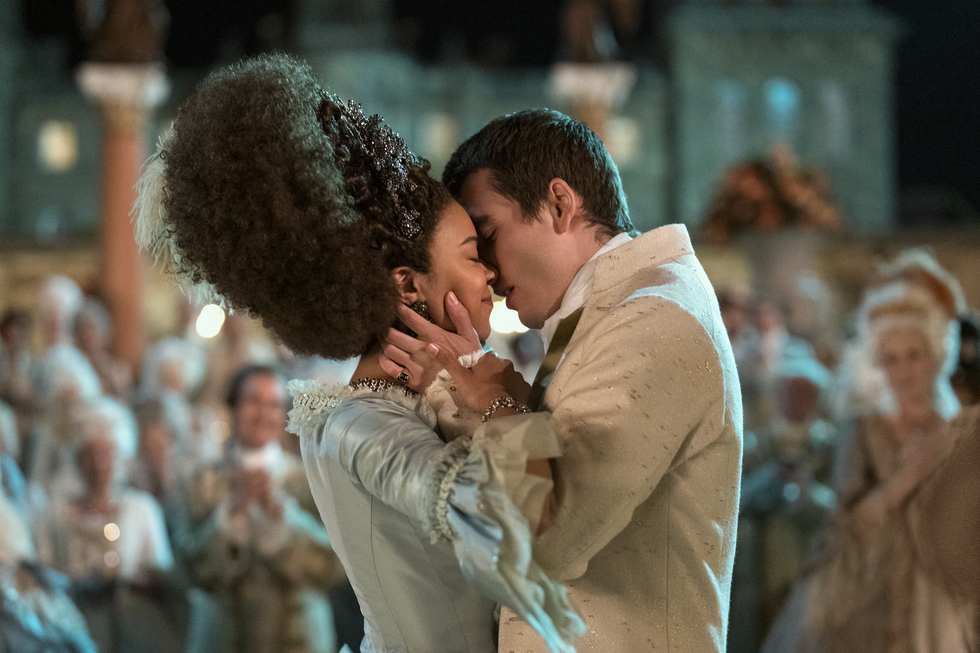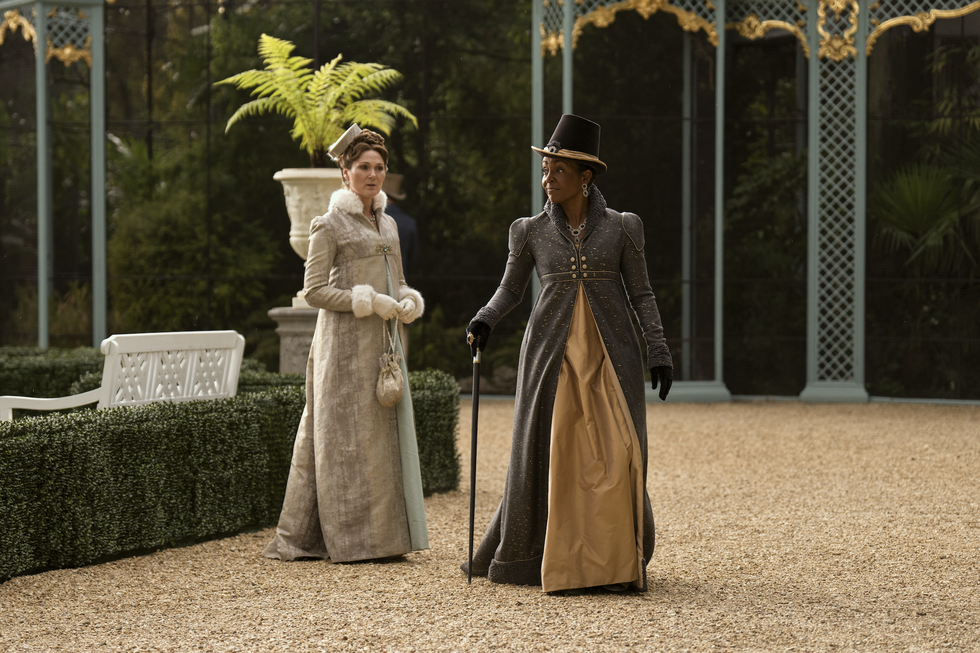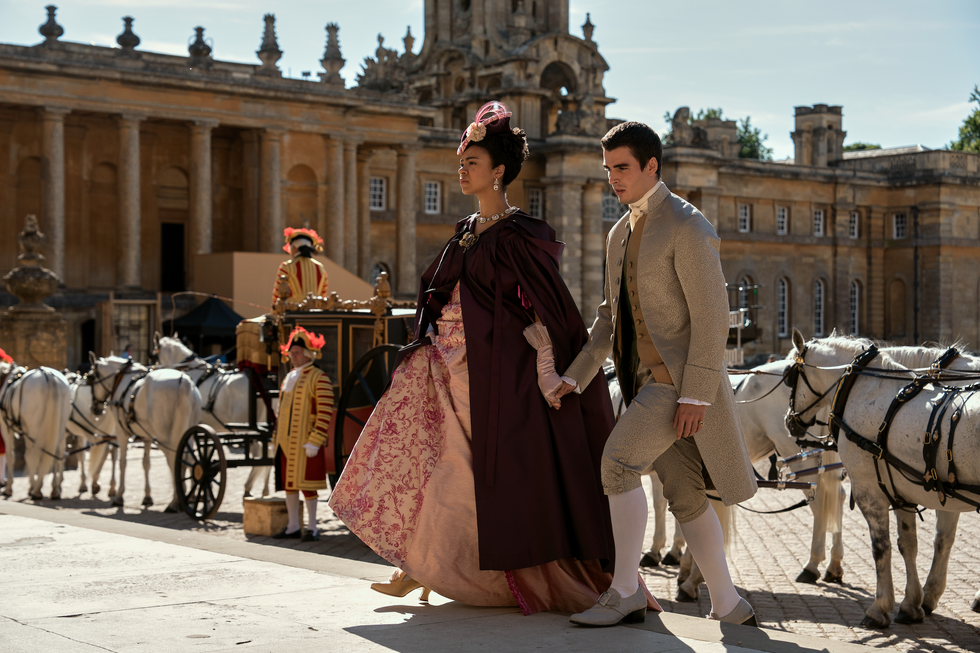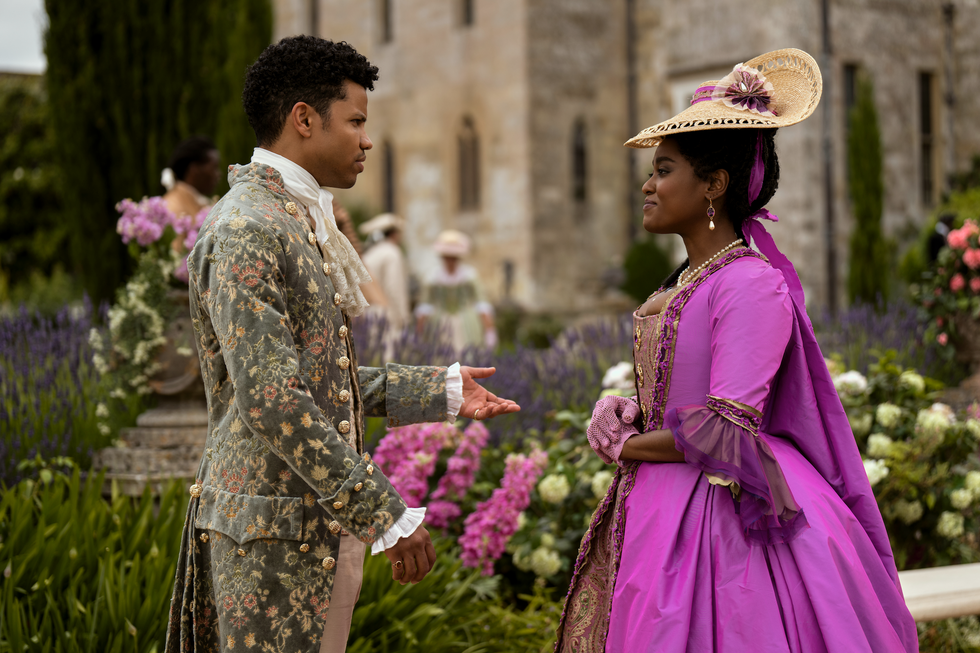Queen Charlotte Pulls Off Bridgerton‘s Finest Finale Yet
Spoilers ahead.
Bridgerton has never been the type of show to merely flirt with its themes; it is as head-over-heels in all-consuming love with love as its perpetually smitten characters. Yet Queen Charlotte, the new Netflix spin-off series and latest addition to the larger Bridgerton canon, is the first to tackle what is arguably love’s most important quality: the endurance the act requires.
Previous Bridgerton seasons have addressed marriage, sex, race, innocence, guilt, patriarchy, parenthood, pleasure, duty, and deliverance largely through the arcs of two couples: Daphne Bridgerton (Phoebe Dynevor) and Simon, the Duke of Hastings (Regé-Jean Page); and Anthony Bridgerton (Jonathan Bailey) and Kate Sharma (Simone Ashley). But with these pairs, we have only ever watched the beginnings of their romance and courtship, then their tempestuous procession to the altar, and finally a peek into the early months (and feverish, uh, exploration) of their married life. With Daphne and Simon, we watched the birth of one child, but did not glimpse much further into the contours of what’s implied to be a long life together. It does not help matters that, ever since season 1, Simon has been conspicuously missing from his own home.
More From ELLE
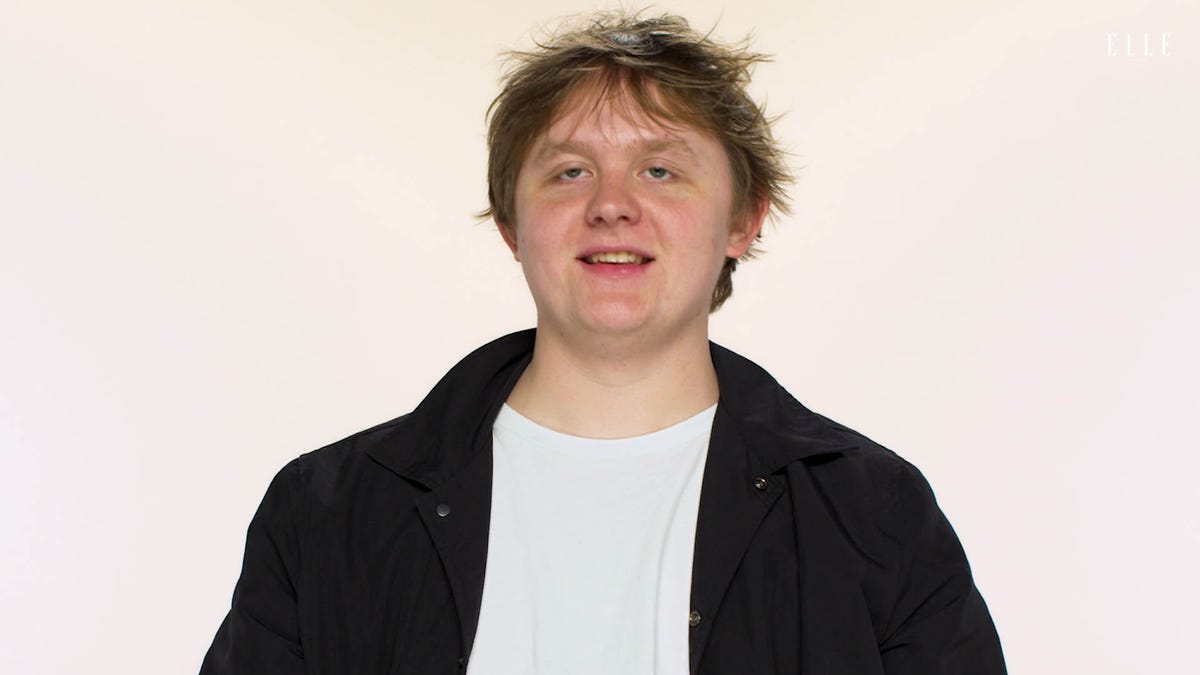
Queen Charlotte, by contrast, begins with a marriage and ends not with catharsis (or, forgive me, climax)—but with wisdom. The relationship between Queen Charlotte and King George is romantic, yes, but only so often in a manner understood as romantic. These characters have sex on screen many times, as is Bridgerton’s protocol, but these scenes are not the goal of the audience’s attention. Their tenderness, but especially their frequency, serve to set up what the sixth and final episode hammers home: the shock that life is short but love is long, and commitment is not one but many choices. As such, the Shonda Rhimes-led limited series delivers Bridgerton’s finest finale yet.
This hour-and-a-half finale, “Crown Jewels,” begins in Bridgerton’s version of the “present day,” a.k.a Regency-era London. The Agatha Danbury (Adjoa Andoh) we know and love invites Violet Bridgerton neé Ledger (Ruth Gemmell) on a stroll, during which they contemplate Violet’s euphemistic “garden” and her curious desire to meander through it in pursuit of new love. Agatha is encouraging, though Violet remains distracted by the revelation of a paper birthday hat in Agatha’s drawing room: the same sort of paper birthday hat Violet’s father, Lord Ledger (Keir Charles), used to make. How very peculiar!
Later, in the midst of this aforementioned stroll, Violet attempts to suss out the details behind this hat. Did Agatha ever take a lover? Might his last name have started—oh, I don’t know, perhaps with an L? But Lady Danbury is as perceptive as ever, and she diverts this line of questioning with the drop of a different juicy nugget: She was once courted by Queen Charlotte’s brother, Prince Adolphus (Tunji Kasim). Scandalous! Still, Violet refuses to quit yanking on the birthday-hat thread until it unravels. When Agatha next drops by to visit, she displays all her accumulated hats across the parlor’s mantle and tables, and as Agatha takes in this unsubtle change of decor—and its intended meaning—the two friends share a long, knowing look. Agatha never directly admits to that which Violet already knows is true. But she confirms it anyway when she offers Violet this kindness: Don’t pack away the hats. Keep them. Remember what they mean.
Elsewhere, though in the same timeline, Queen Charlotte (Golda Rosheuvel) is still bemoaning the absence of her royal heir. She implores her children to get it on—ideally, faster and with more enthusiasm. But at least one of the royal progeny, Georgie, is still grieving the loss of his own daughter. And so he and his sister take it upon themselves to air their grievances before Charlotte herself. In her zeal for a grandchild, she’s been dismissive of their feelings, they claim. Actually, that’s too soft a term. She’s been cruel. She has missed the signs: of their miscarriages, of their mourning, of their private battles. “You do not know us,” Georgie informs his mother, a particularly heartbreaking admission given the audience’s understanding that, in the show’s adjacent timeline, a young Queen Charlotte is pregnant with this same son. “You have been our queen, but you have never really been our mother.”
This queen then tries to convince herself he is lying and ungrateful, but Brimsley (Hugh Sachs), her now-aging servant, reminds her of the fundamental truth of her existence: Her life revolves around King George. As such, it cannot—could not—revolve around her children. Brimsley also reminds her, with a hint of a tremor in his voice, that he, too, has sacrificed everything for the benefit of the monarchy. Charlotte does not and cannot know just how much he means it.
When the episode zooms backwards, it returns us to Georgian-era London, shortly after the young Charlotte (India Amarteifio) has removed young King George (Corey Mylchreest) from the “care” of his doctor. When she greets her husband in his observatory—where he wolfs down what’s likely his first real meal in weeks—he flinches from both her gaze and her touch. Not only is he physically and mentally traumatized; he blames himself for his inability to “fix” his “fits,” and for putting his wife in some sort of harm’s way in the process. As his voice rises with increasingly desperate demands for Charlotte to abandon him to his misery, she only sashays closer. “I have heard that you wish I had not come,” she says, her own tone matching his tenor. “That you want me to go. That you do not want to see me. What I have not heard is that you do not love me.”
She understands, now, that George did not slink from her presence because he found her repulsive, but because he deemed himself undeserving of her affection. It was easier to hide rather than confront what he assumes is reality: that he is a “madman,” and therefore incapable of the marriage his queen needs. But George is equally incapable of denying his love for Charlotte, and so he weeps, collapsing into his wife’s arms and surrendering to her promise that nothing they face need be faced alone.
But that still leaves the issue of their kingdom. Princess Augusta (Michelle Fairley) tells members of the House of Lords that there’s nothing to be concerned about regarding her son’s health. He has a new doctor! She just isn’t sure of this doctor’s name. (“I do not remember names. I am female,” she says, to which the lords have no objection.) Still, they agree that a healthy King George should be made available for an address before Parliament, even if King George himself is less than enthused by this idea. Augusta attempts to convince him herself, but Charlotte blocks her path, convinced that the last thing her husband needs is an intrusion from the woman who hired the dreaded Doctor Monro (Guy Henry). But Augusta has a valid point to deliver: King George is, in fact, a king. He must rule. He cannot do so from the millet fields surrounding Kew.
Away from the palace, we watch a young Agatha Danbury (Arsema Thomas) meet with Lord Ledger, the much older man with whom she’s been, uh, strolling for a few weeks now. Their most recent stroll having been particularly productive, she’s eager to further explore the blooms of her own garden. But upon their next meeting, he arrives with a third wheel in tow. Lo and behold—it’s his daughter, a young Violet Bridgerton (Connie Jenkins-Greig). Instant mood-killer. In the fields, Lord Ledger and Lady Danbury exchange loaded glances and coded words, hinting at the one-time nature of the tryst they shared and the respect they’d lose should the affair continue—or, worse, be made known. By the time they part ways, it’s clear they will not meet again.
And so Agatha turns her attention to matters in which she holds more sway. She wants to retain her title, and for it to be passed down to her children and beyond. But Princess Augusta is hesitant to grant such a wish without the exchange of information about Charlotte, with whom Agatha has become close. And Agatha will not betray Charlotte’s confidence. With such a stalemate blocking their mutual progress, Agatha considers turning to Charlotte herself for help. But with the king’s mental health struggles and the due-any-day royal baby, Agatha doesn’t want to burden her friend.
As Charlotte and her husband return to Buckingham House so that George can prepare to address Parliament, she shares tea in the orangery with Agatha. She asks her friend if there’s anything she can do to assist in the wake of Lord Danbury’s recent death, and though Agatha is tempted to argue her case for title inheritance, she resists for Charlotte’s sake. Nor does she mention Adolphus, whose affections for Agatha are becoming impossible to ignore. The question of whether to marry again now lingers over her every move, even as she tries to avoid Lord Ledger’s gaze in public.
In the Buckingham halls, Charlotte attempts to assuage George’s own concerns over his upcoming speech, only to suddenly discover herself in the throes of labor. George breaks palace protocol in order to sit with his wife as she delivers their infant son, Georgie, whom Augusta worries might have inherited her son’s fits. “He is perfection,” she finally allows, after George firmly shuts down her questioning.
Slighted, Augusta once again sits down with Agatha and attempts to squeeze the young Lady Danbury for information about Charlotte, who Augusta is convinced is trying to “run the Crown.” For the first time all season, Agatha breaks. Overwhelmed by the pressures of the choices before her—and the losses she has already suffered—she trembles and cries. Augusta is both surprised and, briefly, disgusted, though her disgust soon morphs into something like recognition. Not empathy, to be clear, but perhaps acknowledgment. She, too, has had to to align herself with the whims of men in order to survive their games. She slips her young “adversary” a dash of pear brandy and urges Agatha not to give in. “Cover your bruises,” she orders, “and endure.” And so, when Adolphus does eventually propose, Agatha does not immediately answer. Augusta has given her too much to consider.
Elsewhere in London, George’s Parliament speech does not go well. In fact, it doesn’t “go” at all. His anxiety and fits prevent him from exiting his carriage, and he returns to Buckingham House shaky, only barely clinging to lucidity. Charlotte discovers him “hiding from the heavens” underneath their four-poster bed, and she crawls down beside him, reminding him that it matters not if he is only “half a king” if he is also “half farmer”—as long as he is always “just George.” She will not abandon him. She will bring Parliament to him. Together, they will throw a ball at Buckingham in honor of the new prince, and they will re-solidify the power of not just their family but the Crown.
Indeed, they put on a true spectacle. At the ball, Charlotte twirls about in her pastel gown and glittering diamonds, and she holds steady to George’s hand, leading him as opposed to vice versa. This dynamic is not something that passes unnoticed by Princess Augusta, who realizes, finally, that Charlotte is not controlling the Crown. She’s steadying it. Just as Charlotte performs this act of commitment for her husband, so does Agatha realize she can never again do the same. She denies Adolphus’ proposal, satisfied in the knowledge that, regardless of whether her choice is the right one, it is hers alone to make. And a newly pregnant Charlotte is supportive, only urging—firmly, as befits a queen—that Agatha never again hide her concerns from her friend.
The camera lens blurs, returning us next to the “present day.” We watch the older Queen Charlotte welcome her son, Edward, and his new wife, Victoria, into her parlor. There, they deliver the long-awaited news: Victoria is pregnant with a little princess. Charlotte, overcome with affection for her son and daughter-in-law, rushes to tell her husband the happy news. But the aging King George (James Fleet), as we know from previous Bridgerton chapters, is not well.
Charlotte finds him in the bedroom they once shared, scribbling on the walls and conversing with the sky. Understanding him—seeing him, not merely observing him—she gets to her knees and ducks underneath the four-poster bed, asking not for her king or even her husband but for “farmer George.” Just George. He recognizes something in this gesture, and so he drops down to meet her, their bodies now obscured from the glare of the heavens. It is in this position that Charlotte shares her ecstatic news, that his line will continue on with an heir, and George reminds her, gently, that this is not the whole truth, is it? It is their line that will live on. And no matter if he is able to recognize it, name it, or recall it for what it is—her commitment, her loyalty, her love—he will be eternally grateful that she did not “go over the wall.” From the moment they met in the palace garden in episode 1, with Charlotte attempting to climb away from what she feared might become a trap, she has instead chosen to stay.
Here, the camera plays with perspective so that we see this duo as both young and old, never fixed in one time but always with their eyes on each other. It is an old trick, this cutting-and-splicing effect, and yet Rhimes and her crew pull it off with astounding grace. The scene is everything that Queen Charlotte is about, and everything that makes Queen Charlotte work as a series: It is committed, and so, too, becomes the audience.
Every character in the show is confronted, then, with the lengths of their life. In one particularly heart-wrenching finale scene, Brimsley spins alone outside the palace walls, remembering the private dance he once shared with his secret lover, the king’s servant Reynolds (Freddie Dennis). We are never given the story of what exactly happened to Reynolds, but it’s implied that, at some point, Brimsley was forced to carry on without him. Still, his love remains; his love endures. As does Agatha’s, if only for her own family and her own mind. So, too, does Violet’s, for her late husband, for her trapped father, and for whomever she might yet love still.
Finally, it is Charlotte and George’s love that persists, even if it is different than it once was, even if it has required they sacrifice more than they could have imagined. Charlotte faces much of her daily life alone. George must bounce between the shards of his fractured mind. Their children feel the lack of both their father’s presence and their mother’s emotional availability. But together, as Charlotte promises, they remain whole—the operative word being “remain.” It is a daily choice, and one they are happy, truly happy, to make. That is the theme Queen Charlotte ultimately offers, and though Bridgerton has oft faced accusations of saccharine froth, this particular love story is anything but insincere.
Culture Writer
Lauren Puckett-Pope is a staff culture writer at ELLE, where she primarily covers film, television and books. She was previously an associate editor at ELLE.

